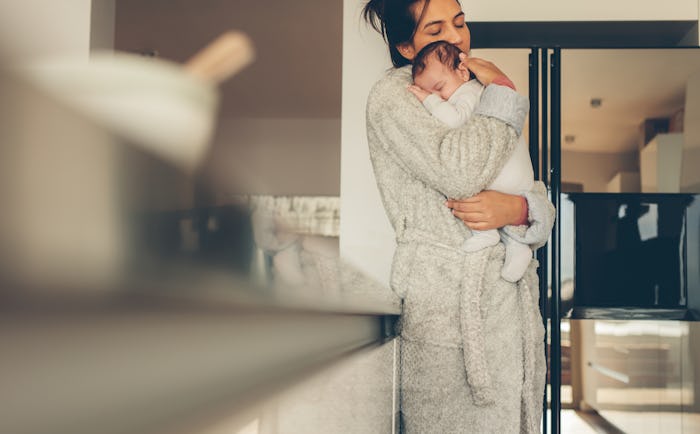Life

Here's Why Your Baby Loves Sleeping On Your Shoulder
One of my favorite parts of newborn life is the constant snuggling. All three of my babies loved taking naps on my shoulder, and I loved it, too. I tried to put them down in their bassinets or cribs once they were asleep, but more often than not they weren't having it. The entire situation definitely made me wonder, why does your baby love sleeping on your shoulder? Is it magic or instinct or a little bit of both? And perhaps, most importantly, is it safe to let them snooze on you if that's what they prefer?
If your baby likes to sleep on your shoulder, they aren't alone, but you might consider making some changes both for their safety and your ability to get some sleep in the long term. The American Academy of Pediatrics (AAP) recommends putting your baby to sleep on a flat surface by themselves, for naps and at bedtime. If your baby falls asleep in your arms or in a baby carrier, AAP recommends you move them to a safe sleep space — like a crib or bassinet — as soon as they fall asleep, to reduce their risk of sudden infant death syndrome (SIDS) and suffocation. This is all easier said than done, to be sure, and especially when it seems like your shoulder is the only place your baby will sleep. As Dr. Marianne Neifert wrote for Parents, your shoulder might be comfy because your baby has a tummy ache. But according to The Baby Sleep Site, as tempting as it is to let your baby sleep in whatever position they choose, you might want to consider breaking them of the habit of sleeping on your shoulder early, so they (and you!) can get more sleep.
The AAP supports skin-to-skin contact with your baby during their first few days of life, which can help regulate their body temperature and may assist with breastfeeding. But the academy also reports that holding your baby while they sleep is not safe, whether in your arms or in a baby carrier, because it can increase their risk of SIDS or suffocation. That's why the AAP's official safe sleep guidelines recommend that parents put their babies down on a safe, flat surface by themselves as soon as they are asleep.
This can be easier said than done, though, especially when you can't get your baby to sleep in a crib or on a flat surface. So, why does your baby seem to favor your comfortable shoulder? As Seema Csukas, MD told Parenting.com, your baby might like sleeping on you because you smell good. She explains that newborn babies have a highly developed sense of smell, and their favorite smell is their mom's — which might also be why your smelliest pajamas soothe them when you aren't around.
Your baby also might love the way you sound. In fact, one study published in the journal Proceedings of the National Academy of Sciences showed that premature newborn babies' brains actually developed in response to hearing their mothers' heartbeats and voices singing lullabies.
As Dr. Marianne Neifert wrote for Parents, your shoulder also might be comfy for your little one because they have tummy troubles. She explains that babies with reflux or gas might feel better when they sleep in an upright position pressed against your shoulder, especially right after eating. She recommends holding your baby upright during and for at least 20 minutes after eating, in order to burp them and allow their stomachs to settle. If your baby is having trouble sleeping or eating due to reflux, she recommends calling your doctor to see if they need medical treatment.
Because newborn babies can be difficult to soothe, you might be tempted to do whatever it takes to help them sleep. But the Baby Sleep Site suggests that parents consider breaking their babies of the "sleep on mom" habit by the time they're 3- or 4-months-old, by transferring them to a safe, flat sleep surface as soon as they fall asleep. This will help keep your baby safe, and prevent them from getting used to sleeping in your arms, which can make it hard for them to sleep anywhere else. If you suspect your baby has reflux, the same site suggests not feeding them in order to get them to sleep, and, instead, making sure their bedtime feeding ends 20-30 minutes before they're ready to pass out, and you hold them upright before laying them down to sleep in their cribs.
Check out Romper's new video series, Bearing The Motherload, where disagreeing parents from different sides of an issue sit down with a mediator and talk about how to support (and not judge) each other’s parenting perspectives. New episodes air Mondays on Facebook.